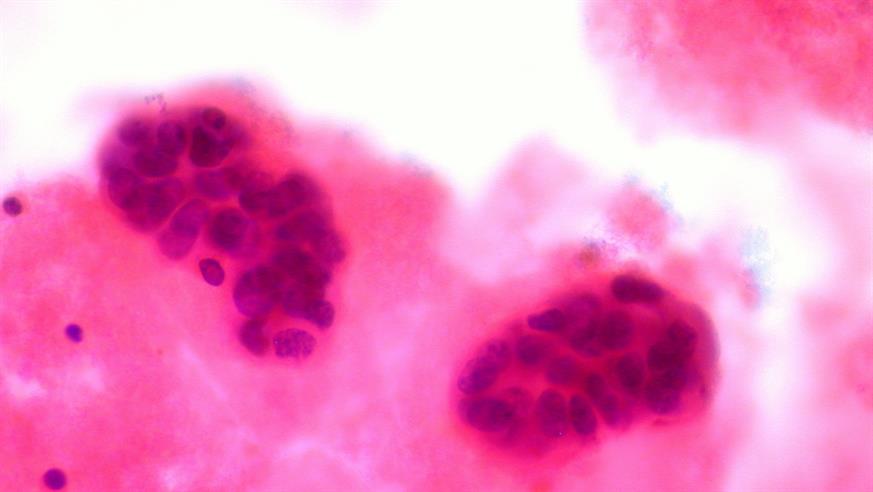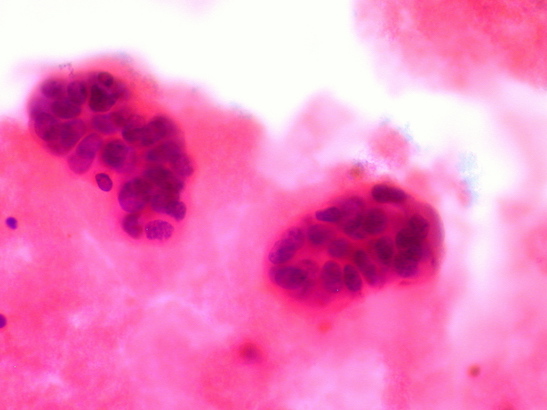
Metastatic breast cancer cells in pleural fluid. Image from flickr user Ed Uthman. License: CC BY 2.0
A major phase III trial of capivasertib, a cancer drug discovered following collaborative work between The Institute of Cancer Research, London, and partners, has begun in breast cancer.
The CAPItello-291 trial, which will enrol around 830 patients across 20 countries, will examine the effects of the drug in pre-menopausal or post-menopausal women, and men, with an advanced form of oestrogen receptor (ER) positive, human epidermal growth factor receptor 2 (HER2) negative breast cancer.
The trial, sponsored by the pharmaceutical company AstraZeneca, will compare the effectiveness of capivasertib combined with fulvestrant, a current hormone treatment, against a placebo with fulvestrant.
If successful, the trial could establish the combination of the two drugs as a new breast cancer treatment regimen, with the potential for regulatory approval.
Research collaborations
Capivasertib is a leading targeted inhibitor of the cancer-driving protein AKT, also known as PKB. The protein is a key node in a signalling network that becomes dysregulated in a range of cancers and helps to drive the disease.
ICR scientists revealed the 3D structure of AKT before researchers at the ICR’s Cancer Research UK Therapeutics Unit worked in collaboration with Astex to discover precursors to the drug. In 2010, AstraZeneca announced its discovery of capivasertib (also called AZD5363) and began to develop the drug as a potential treatment for various forms of cancer.
The initial clinical development of capivasertib was centred on an early-stage trial which was led by the ICR and its partner hospital The Royal Marsden NHS Foundation Trust. Subsequently, phase II studies were completed in the UK under the auspices of AstraZeneca in collaboration with the UK Cancer Research Network.
Survival benefit
The launch of the CAPItello-291 trial follows the announcement of the initial results of a phase II trial called FAKTION, led by researchers at the Velindre Cancer Centre, Cardiff University, the University of Manchester and the Christie NHS Foundation Trust.
The results were published in The Lancet Oncology in February and suggested that capivasertib could provide a six-month survival benefit to women with advanced ER-positive breast cancer when used alongside fulvestrant.
ER-positive, HER2-negative breast cancer cells have copies of the oestrogen receptor – allowing them to grow in the presence of oestrogen – but do not over-produce copies of the human epidermal growth factor (HER2).
This subtype of breast cancer is often driven by activation of AKT and, once the disease has relapsed or spread, current treatment options are limited.
Triple-negative breast cancer
The launch of CAPItello-291 follows the recent launch of the similarly named CAPItello-290 phase III trial, which will recruit around 800 women with triple-negative breast cancer from 200 centres worldwide.
Led by the Barts Cancer Institute, CAPItello-290 will compare capivasertib and paclitaxel with a placebo and paclitaxel, and follows the recent publication of results in The Journal of Clinical Oncology from the successful phase II trial PAKT, which was also led by researchers at the Barts Cancer Institute.
The results of the phase II trials of capivasertib indicate that it has the potential to be an option for sub-groups of women whose cancers do not respond to other therapies.
The ICR runs the world’s most successful academic drug discovery programme in oncology, having discovered 20 new drug candidates since 2005. It is building a new state-of-the-art drug discovery centre, the Centre for Cancer Drug Discovery, to create more and better drugs for cancer patients.
The Centre will also enhance the ability of scientists at the ICR to partner with industry to take their discoveries to market.
Potential treatment is ‘great news’
Professor Nick Turner, Professor of Molecular Oncology at the ICR and Consultant in Medical Oncology at The Royal Marsden said:
“After a long history of discovery and development at the ICR in collaboration with partners, it is great news that this trial of capivasertib is exploring a potential treatment for oestrogen receptor positive breast cancer. This trial could lead to a much-needed new option for some women with inoperable or metastatic breast cancer, which has spread to secondary sites and which can be challenging to treat.”
Professor Paul Workman, Chief Executive of The Institute of Cancer Research, London, said:
“ICR researchers pioneered the idea of targeting AKT as a treatment for cancer and worked in close collaboration with colleagues in industry, setting the foundation for the subsequent creation of this new drug, and with our colleagues at The Royal Marsden to take it to patients.
“It’s very exciting to see a drug discovered and developed thanks to our research now being studied in major phase III trials, which if successful could deliver an urgently needed new option for women whose breast cancer has become resistant to current treatments.”
